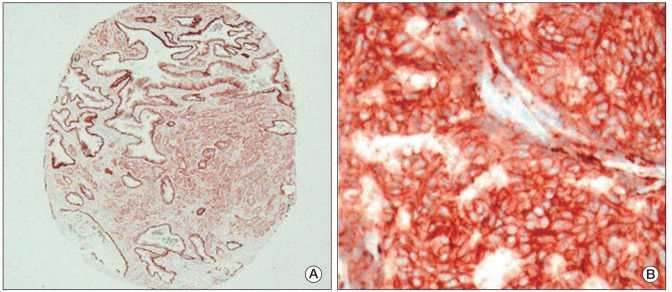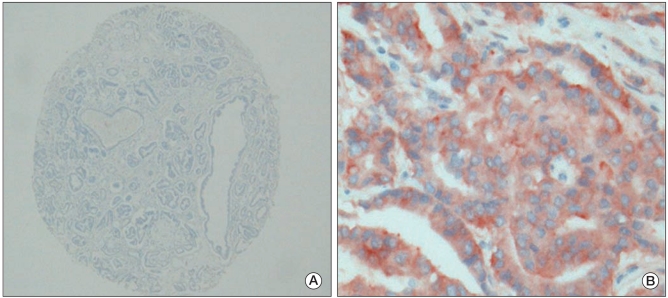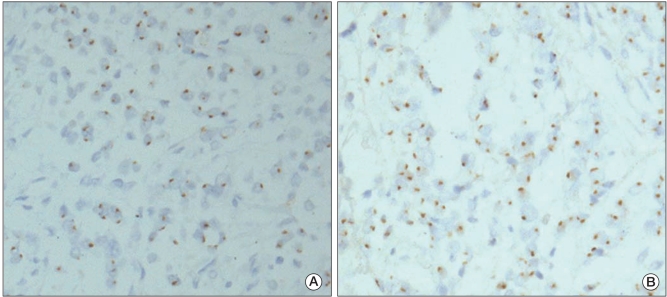Cancer Res Treat.
2012 Mar;44(1):50-56.
Correlation of AR, EGFR, and HER2 Expression Levels in Prostate Cancer: Immunohistochemical Analysis and Chromogenic In Situ Hybridization
- Affiliations
-
- 1Department of Pathology, Chung-Ang University College of Medicine, Seoul, Korea. taejlee@cau.ac.kr
Abstract
- PURPOSE
The androgen receptor (AR) plays a central role in prostate cancer. Evidence from several groups indicates that epidermal growth factor receptor (EGFR) and human epidermal growth factor receptor 2 (HER2) may enhance AR activity in prostate cancer cell lines. This study was designed to investigate the protein expression of AR, EGFR, and HER2 and to determine whether the EGFR and HER2 genes are amplified in prostate cancer tissues.
MATERIALS AND METHODS
The protein expression levels of AR, EGFR, and HER2 in a tissue microarray block of 66 prostate cancer samples were investigated by immunohistochemical analysis and chromogenic in situ hybridization was used to determine whether the EGFR and HER2 genes were amplified in these tissues.
RESULTS
The AR and EGFR proteins were expressed in 59.1% and 40.9% of prostate cancers, respectively, but their expression levels were not significantly associated with clinicopathologic factors. Of the cases in which tissues were negative for EGFR protein expression, 69.2% were positive for AR protein expression; however, AR protein expression was significantly reduced (44.4%) in tissues in which EGFR protein was expressed. HER2 expression was detected in only 1 case (1.5%). No amplification of the EGFR or HER2 genes was found in prostate cancer specimens.
CONCLUSION
This study was limited by small number of subjects, but it can still be inferred that the expression levels of the AR and EGFR proteins are inversely correlated in prostate cancer patients. The potential utility of EGFR and HER2 as prognostic factors or therapeutic targets warrants further study.
MeSH Terms
Figure
Reference
-
1. Mohler JL, Gregory CW, Ford OH 3rd, Kim D, Weaver CM, Petrusz P, et al. The androgen axis in recurrent prostate cancer. Clin Cancer Res. 2004; 10:440–448. PMID: 14760063.
Article2. Montgomery RB, Mostaghel EA, Vessella R, Hess DL, Kalhorn TF, Higano CS, et al. Maintenance of intratumoral androgens in metastatic prostate cancer: a mechanism for castration-resistant tumor growth. Cancer Res. 2008; 68:4447–4454. PMID: 18519708.
Article3. Marks RA, Zhang S, Montironi R, McCarthy RP, MacLennan GT, Lopez-Beltran A, et al. Epidermal growth factor receptor (EGFR) expression in prostatic adenocarcinoma after hormonal therapy: a fluorescence in situ hybridization and immunohistochemical analysis. Prostate. 2008; 68:919–923. PMID: 18409189.
Article4. Craft N, Shostak Y, Carey M, Sawyers CL. A mechanism for hormone-independent prostate cancer through modulation of androgen receptor signaling by the HER-2/neu tyrosine kinase. Nat Med. 1999; 5:280–285. PMID: 10086382.
Article5. Calvo BF, Levine AM, Marcos M, Collins QF, Iacocca MV, Caskey LS, et al. Human epidermal receptor-2 expression in prostate cancer. Clin Cancer Res. 2003; 9:1087–1097. PMID: 12631612.6. Guo Z, Dai B, Jiang T, Xu K, Xie Y, Kim O, et al. Regulation of androgen receptor activity by tyrosine phosphorylation. Cancer Cell. 2006; 10:309–319. PMID: 17045208.
Article7. Gregory CW, Whang YE, McCall W, Fei X, Liu Y, Ponguta LA, et al. Heregulin-induced activation of HER2 and HER3 increases androgen receptor transactivation and CWR-R1 human recurrent prostate cancer cell growth. Clin Cancer Res. 2005; 11:1704–1712. PMID: 15755991.
Article8. Mellinghoff IK, Tran C, Sawyers CL. Growth inhibitory effects of the dual ErbB1/ErbB2 tyrosine kinase inhibitor PKI-166 on human prostate cancer xenografts. Cancer Res. 2002; 62:5254–5259. PMID: 12234993.9. Henttu P, Vihko P. Growth factor regulation of gene expression in the human prostatic carcinoma cell line LNCaP. Cancer Res. 1993; 53:1051–1058. PMID: 7679946.10. Adam RM, Kim J, Lin J, Orsola A, Zhuang L, Rice DC, et al. Heparin-binding epidermal growth factor-like growth factor stimulates androgen-independent prostate tumor growth and antagonizes androgen receptor function. Endocrinology. 2002; 143:4599–4608. PMID: 12446587.
Article11. Cinar B, De Benedetti A, Freeman MR. Post-transcriptional regulation of the androgen receptor by Mammalian target of rapamycin. Cancer Res. 2005; 65:2547–2553. PMID: 15805247.
Article12. Souder C, Leitzel K, Ali SM, Demers L, Evans DB, Chaudri-Ross HA, et al. Serum epidermal growth factor receptor/HER-2 predicts poor survival in patients with metastatic breast cancer. Cancer. 2006; 107:2337–2345. PMID: 17048231.
Article13. Signoretti S, Montironi R, Manola J, Altimari A, Tam C, Bubley G, et al. Her-2-neu expression and progression toward androgen independence in human prostate cancer. J Natl Cancer Inst. 2000; 92:1918–1925. PMID: 11106683.
Article14. Oxley JD, Winkler MH, Gillatt DA, Peat DS. Her-2/neu oncogene amplification in clinically localised prostate cancer. J Clin Pathol. 2002; 55:118–120. PMID: 11865006.
Article15. Yoon CY, Byun SS. Pathogenesis of prostate cancer. J Korean Med Assoc. 2010; 53:98–106.
Article16. Steers WD. 5alpha-reductase activity in the prostate. Urology. 2001; 58(6 Suppl 1):17–24. PMID: 11750244.17. Bostwick DG, Burke HB, Djakiew D, Euling S, Ho SM, Landolph J, et al. Human prostate cancer risk factors. Cancer. 2004; 101(10 Suppl):2371–2490. PMID: 15495199.
Article18. Chen CD, Welsbie DS, Tran C, Baek SH, Chen R, Vessella R, et al. Molecular determinants of resistance to antiandrogen therapy. Nat Med. 2004; 10:33–39. PMID: 14702632.
Article19. Camp ER, Summy J, Bauer TW, Liu W, Gallick GE, Ellis LM. Molecular mechanisms of resistance to therapies targeting the epidermal growth factor receptor. Clin Cancer Res. 2005; 11:397–405. PMID: 15671571.20. Lee JW, Cho KS, Han KS, Kim EK, Joung JY, Seo HK, et al. Epidermal growth factor receptor as predicting factor on biochemical recurrence after radical prostatectomy: a prospective study. Korean J Urol. 2008; 49:974–980.
Article21. Cai C, Portnoy DC, Wang H, Jiang X, Chen S, Balk SP. Androgen receptor expression in prostate cancer cells is suppressed by activation of epidermal growth factor receptor and ErbB2. Cancer Res. 2009; 69:5202–5209. PMID: 19491261.
Article22. Schlomm T, Kirstein P, Iwers L, Daniel B, Steuber T, Walz J, et al. Clinical significance of epidermal growth factor receptor protein overexpression and gene copy number gains in prostate cancer. Clin Cancer Res. 2007; 13(22 Pt 1):6579–6584. PMID: 18006757.
Article
- Full Text Links
- Actions
-
Cited
- CITED
-
- Close
- Share
- Similar articles
-
- In Situ mRNA Hybridization and an Immunohistochemical Study of EGFR in Uterine Cervix Cancer
- Comparison of Her-2, EGFR and Cyclin D1 in Primary Breast Cancer and Paired Metastatic Lymph Nodes: An Immunohistochemical and Chromogenic In Situ Hybridization Study
- Clinicopathologic Analysis of Epidermal Growth Factor Receptor Status in Non-small Cell Lung Cancer: Protein Expression, Gene Amplification and Survival Analysis
- Overexpression of HER2/HER3 and clinical feature of ovarian cancer
- Correlation of EGFR and c-erbB-2 Gene Amplifications and Expression of COX-2 Protein in Invasive Ductal Carcinomas of the Breast





